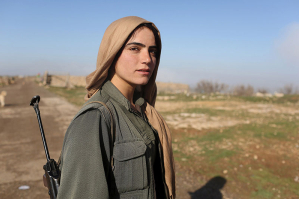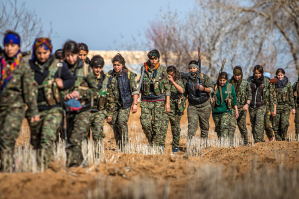
The Islamic terror group known as ISIS has been infamously known for its brutal treatment of Christians and other minorities in the Middle East, especially if they happened to be women. However, an increasing number of them, mostly Kurds, are starting to fight back against that oppression.
According to Anne Bailey and Erin Trieb of PRI's The World, an all-volunteer women's military unit called the YPJ has been established by the Kurds to help defend Kurdish citizens from ISIS attacks in Syria. Trieb, who spent time last summer documenting the group, elaborated on their goals and hopes.
"The YPJ in Kurdish translates to 'Women's Protection Unit,'" Trieb wrote. "They are a female military faction, which sprang up in 2011 out of the larger YPG military, their male counterpart. Their goal initially was to defend the Kurdish population of Syria and all innocent civilians against the deadly attacks led by Syrian President Bashar al-Assad and to further the greater Kurdish resistance movement."
Trieb added that the group's role has now expanded to fighting ISIS on the front lines.
"About 8,000 women from all over Syria, Iraq, Iran, Turkey and elsewhere have volunteered to join the YPJ, and their numbers continue to grow," Trieb wrote.
Trieb told Bailey that she spent four years documenting the plight of U.S. military soldiers fighting in Afghanistan, which drew her into observing and photographing the women of YPJ.
"I think one of the most fascinating features of this particular military group is that they are unpaid volunteers," Trieb wrote. "They aren't drafted; they want to be there. And they are totally consumed with the ideology of defending their people and defeating ISIS, or anyone who opposes their freedom."

The photographer noted that the YPJ identified as "socialists" who had suspicions of "western media." However, Trieb managed to earn the group's trust.
"When I first got to Syria in August 2014, I was welcomed with open arms by the women soldiers," Trieb wrote. "They told me I was one of the first western, American photographers to photograph them."
Bailey then asked Trieb what surprised her the most about the YPJ. She answered that the women's group was "incredibly resourceful" and "willing to die for their philosophy."
"I remember one soldier, Narlene, created a phone charger out of what looked like a bunch of tangled wires and a couple of Duracell batteries duct taped together," Trieb wrote. "It was remarkable to see girls as young as 18 deciding that this is what they would live and die for."
Trieb added that groups like the YPG and YPJ are helping to break social and cultural barriers within the wider Kurdish community.
"They are challenging cultural barriers, traditions and stereotypes of gender roles for Kurds. And somehow the Kurds are embracing it," Trieb wrote. "YPJ soldiers will not marry or have kids. They sleep in the dirt, operate heavy weapons, fight alongside men, and kill ISIS militants - and they are revered by the Kurds."
Bailey asked Trieb if she had been able to follow up with the women and girls depicted in the pictures. Trieb acknowledged that changes have occurred since she last contacted them.
"The small group I initially spent time with there has since split up, and they are now spread out all over Syria," Trieb wrote. "I did hear updates, however - one soldier had fought bravely in Kobane and was well, that another was at a training school in the mountains, that another had been injured but was healing. Two of the soldiers I photographed last fall were killed in action. It's always hard to lose someone you've photographed."
In her final question, Bailey asked Trieb what people in the West should take away from the conflict in Syria. Trieb replied that the Syrians "want to go about living their lives again in a peaceful place to raise their families."
"They're suffering mainly because of ISIS," Trieb wrote. "I think the most acute problem is the absolute disparity of the current refugee crisis and the destitute conditions. There is a total wipeout of government and infrastructure, food and water shortages, no medical supplies or resources, millions of people traumatized."
Trieb added that it was "mind-boggling" to realize that even now, "femicide, rape and gender-based violence are still rampant in various parts of the world."







